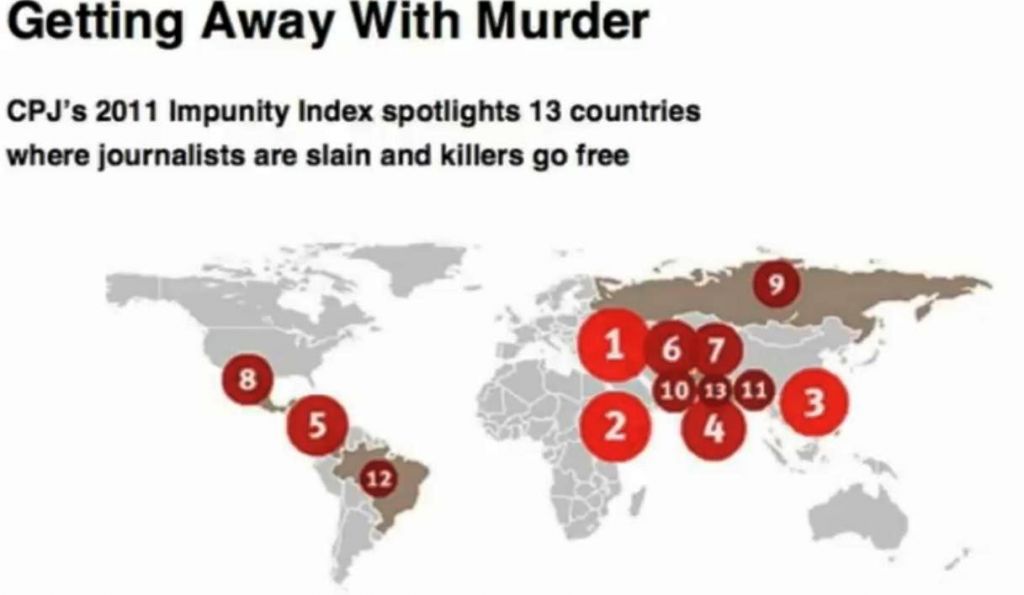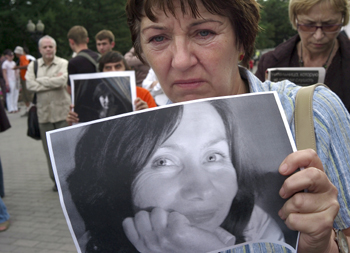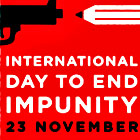On 23 November Article 19, English PEN, Committee to Protect Journalists and Index on Censorship joined dozens of freedom of expression organizations around the world to mark the inaugural International Day to End Impunity.
500 journalists killed
In the past 10 years, more than 500 journalists have been killed. In nine out of 10 cases, the murderers have gone free. Many others targeted for exercising their right to freedom of expression – artists, writers, musicians,  activists – join their ranks.
activists – join their ranks.
This year alone at least 17 journalists were murdered for their work. These include Pakistani journalist Saleem Shahzad, whose body was found May 31 showing signs of torture. They include Mexican journalist and social media activist Maria Elizabeth Macías Castro Macías, whose killers left a computer keyboard and a note with the journalist’s body saying she had been killed for writing on social media websites.
These heinous acts not only silence the messenger, but are intended to intimidate all others from bringing news and sharing critical voices with the public.
The organizations call on governments around the world to investigate and prosecute these crimes and bring an end to impunity.
Remembering “Maguindanao Massacre”
On this day two years ago the single deadliest event for the media took place when 30 journalists and two support workers were brutally killed in Ampatuan, Maguindanao province, The Philippines.
The journalists were part of a convoy accompanying supporters of a local politician filing candidacy papers for provincial governor. In total t he “Maguindanao Massacre” as it has come to be known, claimed 58 victims. Not one of more than a hundred individuals suspected of involvement in the atrocity has been convicted yet.
he “Maguindanao Massacre” as it has come to be known, claimed 58 victims. Not one of more than a hundred individuals suspected of involvement in the atrocity has been convicted yet.
Article 19, English PEN, Committee to Protect Journalists and Index on Censorship join those in the Philippines not only in honouring their slain colleagues, friends and family members, but demanding justice for them and hundreds more in Russia, Belarus, Pakistan, Sri Lanka, Mexico, Colombia, Iraq and Somalia and other countries where killings of journalists and free expression activists have repeatedly gone unpunished.
Ukraine, Belarus and Russia
On the same day Article 19 marked international day against impunity by holding a silent vigil outside the Ukrainian, Belarusian and Russian embassies in London to highlight the unsolved cases of murdered journalists in those countries.
Members of the organization called on the authorities of Ukraine, Belarus and Russia to adopt all necessary political and legal measures to protect journalists and defend the right to freedom of expression, in accordance with their international obligations.
Article 19 claims that None of the masterminds behind the 22 murders or disappearances of journalists have been brought to justice, allowing for impunity to further flourish.
Pervasive climate of fear and impunity prevails
The high profile nature of these cases combined with the apparent lack of political will to solve these crimes has contributed to a pervasive climate of fear and impunity in these countries.
The impunity surrounding killings and disappearances of journalists places t he governments of Belarus, Russia and Ukraine in breach of their obligations under international and European human rights law, particularly the positive obligations in relation to the rights to freedom of opinion and expression, the right to life and the right not to be subject to torture, cruel, inhuman or degrading treatment.
he governments of Belarus, Russia and Ukraine in breach of their obligations under international and European human rights law, particularly the positive obligations in relation to the rights to freedom of opinion and expression, the right to life and the right not to be subject to torture, cruel, inhuman or degrading treatment.
The International Covenant on Civil and Political Rights has been ratified by all three states and the European Convention on Human Rights has been ratified by Russia and Ukraine.
“The impact of impunity is far reaching, resulting in a chilling effect on freedom of expression in Ukraine, Belarus and Russia. These states turn a blind eye to the murder and disappearance of journalists, allowing both the masterminds and perpetrators of such crimes to remain at large. Ultimately impunity kills independent investigative journalism,” said Agnes Callamard.
Governments feel pressure
The flurry of activity, specifically by both the Ukrainian and Russian administrations at opportune moments, and in particular around anniversaries of the murders, shows there is certainly an understanding within their government apparatuses that there has to be a public reaction from their side.
However, says Article 19, these reactions are often just ‘window-dressing,’ as closer to the date of anniversary or another politically opportune moment there is a sudden development in the criminal investigation, specifically in high-profile cases, which then remains without a tangible result. Statements published about the developments in the cases seem to have become largely a public relations exercise to keep national and international critics satisfied.
Even re-opening of investigations does not necessarily lead to results, and without the necessary transparency and involvement of family members and colleagues, there is a fear that this is merely an empty gesture. The general lack of disclosure of information, even to relatives, adds to this concern.
Gongadze and Estemirova – example cases
Despite certain recent developments, such as for example in the cases of Georgiy Gongadze in Ukraine and Natalya Estemirova in R ussia, there is little confidence that this could reverse the overall impunity for attacks and killings of journalists.
ussia, there is little confidence that this could reverse the overall impunity for attacks and killings of journalists.
Georgiy, the co-founder/editor-in-chief of an opposition website, disappeared on 16 September 2000, and his body was found in November 2000, decapitated. More than ten years since his death a former general of the Ministry of Interior, Aleksei Pukach, alleged to have strangled and beheaded Gongadze, is now being tried behind closed doors, against the wishes of Georgiy’s widow, Myroslava Gongadze. On 24 March 2011 an investigation was launched into the involvement of former President of Ukraine, Leonid Kuchma for ordering the murder.
In the case of Natalia Estemirova, who was killed on 15 July 2009, investigating authorities recently reportedly announced they are now looking into the possibility that local ministry of interior officials were involved in her murder – human rights organisations previously maintained that case file material was made up, significant leads were not followed and that the criminal investigation did not use crucial evidence, such as a comparative DNA analysis.
Take action!
19, English PEN, Committee to Protect Journalists and Index on Censorship have prepared stories about a murdered journalist, writer or free expression advocate around the world. Until 23 November they had revealed a story each day of the person who was killed in the line of duty.
Take action: write a letter demanding justice for: 1 November: Mohammad Ismail
1 November: Mohammad Ismail
2 November: José Bladimir Antuna Garcían
3 November: Abdul Razzak Johra
4 November: Laurent Bisset
5 November: Carlos Alberto Guajardo Romero
6 November: Wadallah Sarhan
7 November: Ahmed Hussein al-Maliki
8 November: Francisco Castro Menco
9 November: Dilip Mohapatra
10 November: Misael Tamayo Hernández
11 November: Johanne Sutton, Pierre Billaud and Volker Handloik
12 November: Gene Boyd Lumawag
13 November: José Armando Rodríguez Carreón
14 November: Seif Yehia and Ibraheem Sadoon
15 November: Fadia Mohammed Abid
16 November: Olga Kotovskaya
17 November: Meher-un-Nisa
18 November: Tara Singh Hayer
19 November: Eenadu-TV staff
20 November: Namik Taranci
21 November: Ram Chander Chaterpatti
22 November: Raad Jaafar Hamadi
23 November: Ampatuan massacre victims
Related articles:
Unsafe to be otherwise-minded in the Middle East
New report: No justice for journalists in Belarus, Russia and Ukraine
Russia: two sentenced for murder of journalist Baburova and human rights lawyer Markelov
Belarus: suspicious ‘suicide’ of human rights activist and Charter97 founder
Attacks on journalists in Belarus, Ukraine and Russia – attacks on freedom of expression
2010 Impunity Index anounced by Committee to Project Journalists
Russia: Chechen human rights advocate remembered





